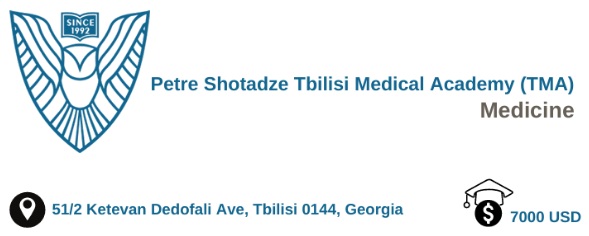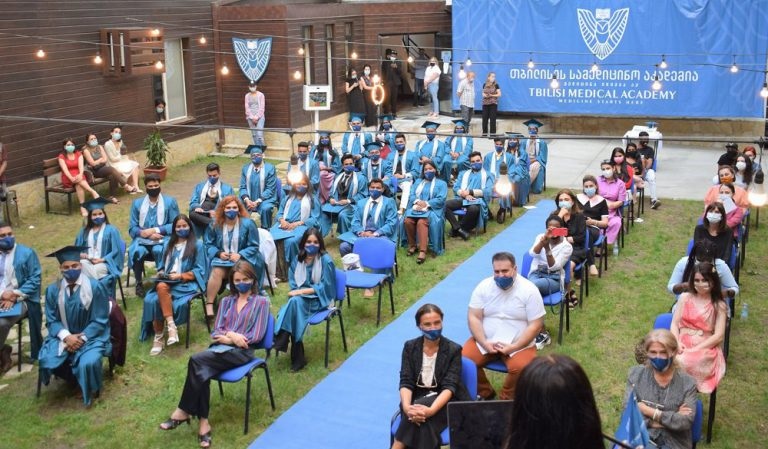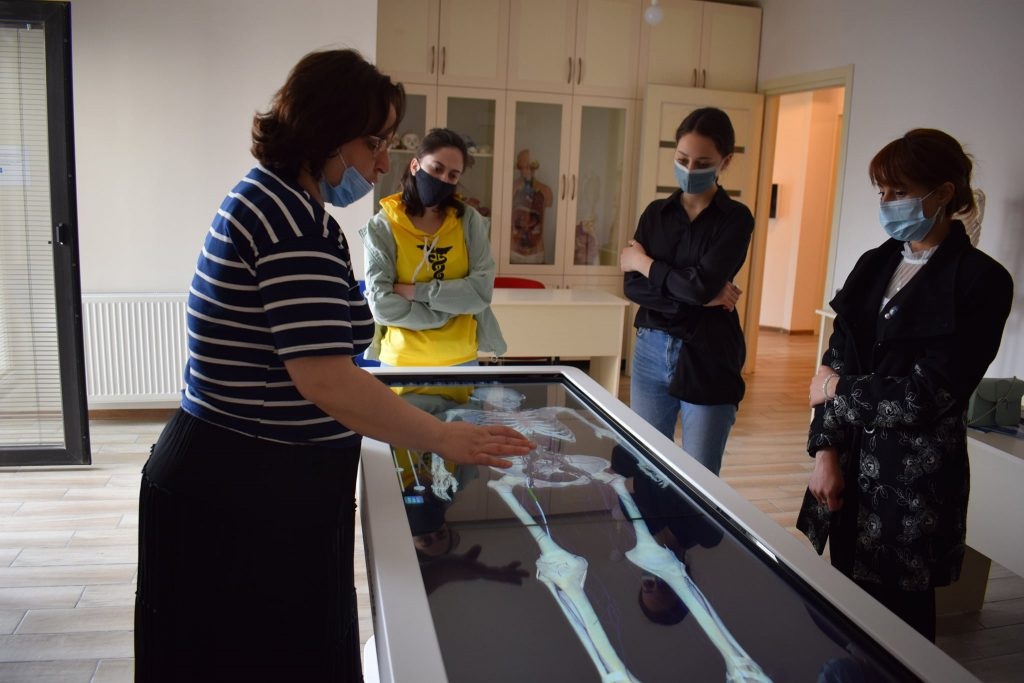Study Medicine in Tbilisi Medical Academy
Study Medicine in Tbilisi Medical Academy: Your Gateway to a Global Medical Career

Why to Study MBBS in Tbilisi Medical Academy
Tbilisi Medical Academy (TMA), founded in 1992 by renowned Georgian physician Prof. Petre Shotadze, was among Georgia’s pioneering private medical institutions. Since its establishment, TMA has committed to sustainable growth by continualy integrating international standards in education, research, and clinical training. With over 2,500 graduates working in leading hospitals and research centers worldwide, TMA has established itself as a key player in global medical education. The academy offers international exchange programs, alowing students to study abroad and gain valuable experience. TMA is recognised by various prestigious organizations, such as the World Directory of Medical Schools (WDOMS), WFME, and FAIMER. The academy currently offers two one-step medical education programs in both Georgian and English, as wel as residency programs. Its commitment to global standards ensures that TMA graduates are wel-prepared for international careers.
“TMA, as a student-oriented higher education institution, primarily seeks to teach and develop national and international healthcare professionals in an innovative manner by using evidence based knowledge, whilst practically benefiting the community in Georgia through research basedoutreach activities.” – TMA’s Mission
Tbilisi Medical Academy (TMA) Medicine Program Overview
The one-step educational program in Medicine at TMA spans 6 years (12 semesters) and is equivalent to the second stage of higher academic education. It is structured around the European Credit Transfer System (ECTS), with a total of 360 credits required to graduate. Each credit represents 30 hours of study, with students earning 30 credits per semester and 60 credits per academic year. The program is delivered in English, and upon successful completion, students are awarded a Medical Doctor (MD) degree.
Admission Requirements to Study Medicine in Tbilisi Medical Academy (TMA)
An online interview via Zoom is required to gain admission, during which applicants must demonstrate motivation and proficiency in English (B2 level).
Proof of English language skills is highly prioritised, and a strong understanding of basic sciences like physics, chemistry, and biology is necessary for successful entry into the program.
Applicants who have completed secondary education or its equivalent in English, or those who have completed the last two years of their education in English, can be admitted to the program without taking the Unified National Examinations, following the guidelines of the Ministry of Education and Science of Georgia.
Admission requires proof of English proficiency at a B1 level, demonstrated through certificates like IELTS, TOEFL, or an English-taught secondary education diploma. Applicants must also provide transcripts with a focus on Natural Sciences, including biology, chemistry, and physics.
Program Goals and Objectives to Study Medicine in Tbilisi Medical Academy (TMA)
The primary goal of TMA is to produce highly competent healthcare professionals who are well-versed in both theoretical knowledge and practical clinical skills. The program focuses on evidence-based medical education and provides students with the opportunity to engage in research and clinical rotations. TMA aims to prepare students for global medical careers, including passing licensing exams while fostering a commitment to lifelong learning and professional development. The aim is to train Medical Doctors by enhancing their roles and competencies within society. This is achieved by equipping them with up-to-date, evidence-based knowledge in line with international standards. The program emphasises the importance of understanding public health systems, developing clinical, communication, and research skills, and fostering ethical values crucial for medical practice. It also encourages students to become reflective professionals with a commitment to lifelong learning, ready to continuously improve their skils and adapt to the evolving medical landscape
TMA’s key objectives include:
- Teach students about disease mechanisms and treatments, integrating molecular, cellular, and clinical knowledge to diagnose and treat patients.
- Enable clinical reasoning by applying scientific principles and understanding healthcare systems.
- Develop clinical skills in patient care, focusing on patient-centered, holistic care, and safety.
- Instill professionalism and ethical behaviour, motivating lifelong learning and critical thinking.
- Enhance communication skills for interactions with patients, healthcare providers, and society.
- Teach healthcare systems, epidemiology, and disease prevention, focusing on quality care and societal needs.
- Cultivate responsibility and social awareness in healthcare practice.
- Encourage knowledge creation and research through scientific methodologies.
- Promote teamwork and collaboration with colleagues and healthcare providers
Structure of the TMA’s Medicine Program
The program is divided into three phases:
|
Stage |
Duration |
Focus Areas |
Key Subjects/Skills |
|
Stage 1: Pre-Clinical Years |
1st to 3rd Year |
Basic sciences and patient examination techniques |
Anatomy, Physiology, Biochemistry, Public Health, Medical Ethics, Communication Skills |
|
Stage 2: Clinical Years |
4th to 5th Year |
Clinical knowledge and practical skills through clerkships and simulations |
Internal Medicine, Surgery, Paediatrics, Obstetrics/Gynaecology, Disease Mechanisms, Clinical Skills |
|
Stage 3: General Specialisation |
6th Year |
Rotations across key disciplines, clinical skills assessments, and OSCE exams for graduation |
Patient Care, Integrated Professional Competencies, Research, Elective Courses (Medical Genetics, Infectious Diseases, Non-Invasive Imaging) |
Teaching and Learning Methods for Medicine at TMA
TMA combines both theoretical and practical teaching methods to provide a well rounded medical education. The curriculum includes lectures, seminars, laboratory work, and active learning, complemented by clerkships and clinical rotations. These elements give students hands-on experience in real healthcare settings, helping them apply medical knowledge to practice and develop essential clinical skills. As well as this, TMA’s teaching methods are designed to balance theoretical knowledge with practical training. Students engage in interactive lectures, group discussions, and hands-on learning during clinical rotations. Problem-based learning (PBL) is also a key feature, encouraging critical thinking and active participation. The curriculum emphasizes early clinical exposure, allowing students to apply their knowledge in real medical settings, ensuring a well-rounded education. PBL encourages students to solve real clinical problems in small groups. It fosters critical thinking by focusing on case studies where students must diagnose, analyse, and propose solutions, integrating theoretical and practical knowledge to enhance learning.
Interactive Lectures: Traditional lectures are enhanced by interactive elements, encouraging student participation and engagement.
Practical Work: Students gain hands-on experience through practical training, often using simulators and mannequins in a controlled environment.
Problem-Based Learning (PBL): Students engage in PBL, where they solve clinical cases, fostering critical thinking and problem-solving skills. This longitudinal method continues throughout the program.
Simulation Training: Students practice dental techniques and procedures using phantoms and virtual dissection to simulate real-life situations, helping them to acquire practical experience.
Clinical Rotations: As students progress through the program, they participate in clinical rotations, working directly with patients under supervision in various healthcare settings, which allows them to apply theoretical knowledge in practice
Teaching Formats:
- Lectures and seminars
- Practical and laboratory work
- Early Clinical Exposure (ECE)
- Active learning formats such as CBCR, TBL, CBL, and FC Case-Based Clinical Reasoning (CBCR) sessions Team-Based Learning (TBL) sessions
- Flipped Classroom (FC)
- Case-Based Learning (CBL)
- Clinical clerkships/rotations
Theoretical Methods:
- Verbal methods
- Working with textbooks
- Written assignments
Practical Methods:
- Explanatory and audio-visual methods
- Bedside teaching and demonstrations
- Role play, discussion/debates
- Case studies and VR methods
- Participation in research, assisting doctors
- Creating a Portfolio.
Medicine in Tbilisi Medical Academy : Assessment System
TMA’s assessment system evaluates students through a combination of continuous and final evaluations. This includes mid-term assessments, practical skils tests, and final exams. The grading system ensures students meet competency thresholds in both theoretical knowledge and practical application. Each component, such as clinical performance, participation in seminars, and written exams, contributes to the overal score. Students must achieve minimum passing marks in each section to progress through the program, ensuring they are well-prepared for medical practice.
The assessment system at TMA consists of both intermediate and final evaluations, with 60 points from class activities and midterm exams and 40 points from the final exam. Class activities may include written or verbal assessments, clinical skills evaluations, and portfolio assignments.
|
Assessment Component |
Details |
|
Evaluation Type |
Continuous and final evaluations |
|
Mid-term Assessments |
Practical skills tests, class activities, written and verbal assessments, portfolio assignments, clinical skills evaluations |
|
Final Exam |
Consists of written, oral, or practical exams. Students must score a minimum of 20 points (50%) to pass |
|
Scoring Distribution |
– 60 points from class activities and mid-term exams – 40 points from final exams |
|
Clinical Performance |
Participation in seminars, clinical skills evaluations, and logbooks contribute to the overall score |
|
Thresholds for Progression |
Students must meet minimum passing marks in each section to progress through the program |
|
Integrated Module Assessments |
– All subjects contribute 31 points towards final exam eligibility – Each subject requires a 50% threshold to pass |
|
Key Exam Types |
– SOE (Structured Oral Exam) for communication skills – OSPE (Objective Structured Practical Exams) for basic sciences – OSCE (Objective Structured Clinical Exams) for clinical competencies (end of 6th and 12th semesters) |
|
Feedback and Remediation |
Regular feedback provided for continuous improvement, portfolio assignments for self-reflection and professionalism, and remediation options for skill development |
|
Portfolio and Logbooks |
Used for tracking clinical skills and self-reflection, contributing to overall assessments |
Medicine in Tbilisi Medical Academy: Evaluation and Grading
- The grading system is based on a 100-point scale, where:
|
Grade Range |
Grade |
Description |
outcome |
|
91-100 |
A |
Excellent |
Pass |
|
81-90 |
B |
Very Good |
Pass |
|
71-80 |
C |
Good |
Pass |
|
61-70 |
D |
Satisfactory |
Pass |
|
51-60 |
E |
Sufficient but failed |
Retake the exam |
|
41-50 |
FX |
Failed, but allowed to retake the exam |
Retake the exam |
|
0-40 |
F |
Failed, and the course must be repeated |
Course must be repeated |
Global Recognition of Tbilisi Medical Academy
Graduates of Tbilisi Medical Academy enjoy recognition and success worldwide. The academy’s strong emphasis on research, practical training, and evidence-based education ensures that its alumni are well-equipped to excel in their medical careers. Whether you plan to work in Georgia or abroad, earning your medicine degree from Tbilisi Medical Academy opens doors to numerous opportunities.
Tuition Fees to Study Medicine in Tbilisi Medical Academy
Studying medicine at Tbilisi Medical Academy offers a high-quality education at an affordable price. The tuition fee for the 6-year MD program is $7,000 per year, which is approximately £5,021.
Study Medicine in Tbilisi Medical Academy with Vistamed UK
Are you ready to pursue a career in medicine at Tbilisi Medical Academy? Vistamed is here to help you every step of the way. As a trusted partner, we specialize in assisting students from the UK and beyond in securing their place at Tbilisi Medical Academy. With our expert guidance, you can navigate the application process smoothly and start your journey toward a successful medical career.
Contact Vistamed today to learn more about studying medicine or pursuing an MBBS in Tbilisi Medical Academy. Your future in the medical field starts with us!
FAQs for Study Medicine in Tbilisi Medical Academy
1. Is Tbilisi Medical Academy recognised?
Yes, the medical degree from Tbilisi Medical Academy is recognized by major medical councils around the world, including the Medical Council of India (MCI), World Health Organization (WHO), and other global institutions, enabling graduates to practice medicine internationally.
2. What is the medium of instruction at Tbilisi Medical Academy?
The medium of instruction for the medical programs at Tbilisi Medical Academy is English, ensuring that international students can follow the curriculum easily without any language barriers.
3. What are the eligibility criteria to study Medicine in Tbilisi Medical Academy?
Applicants must have completed their higher secondary education with a strong background in Biology, Chemistry, and Physics. They should have obtained a minimum of 50% marks in these subjects. Additionally, proficiency in English is required.
4. How long does it take to complete the medical program at Tbilisi Medical Academy?
The medical program at Tbilisi Medical Academy typically takes 6 years to complete, including one year of internship or clinical practice.
5. Are there any entrance exams required for admission to Tbilisi Medical Academy?
No specific entrance exam is required by Tbilisi Medical Academy. However, international students may need to pass an interview or a screening test conducted by the university to assess their eligibility.
6. How much does it cost to go to Tbilisi Medical Academy?
The tuition fees at Tbilisi Medical Academy are relatively affordable compared to other European medical schools.For more information contact Vistamed uK
7. Does Tbilisi Medical Academy provide hostel facilities?
Yes, Tbilisi Medical Academy offers well-equipped hostel facilities for international students. The hostels are safe, comfortable, and provide all necessary amenities, including internet access, study rooms, and dining services.






